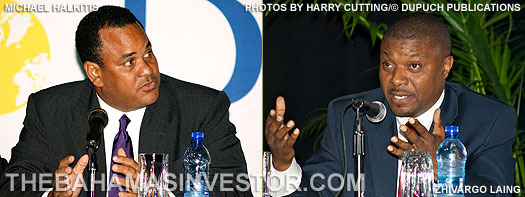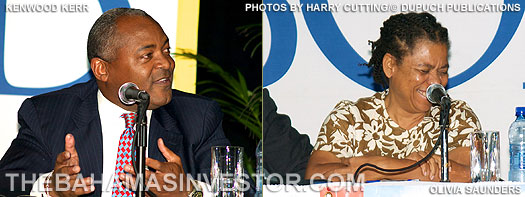| Source: Date: Updated: |
TheBahamasInvestor.com
Friday, March 23, 2012 Friday, March 23, 2012 |
The College of the Bahamas (COB) presented a panel discussion about Bahamian Economic Resiliency and the Global Economic Crisis on Wednesday at its Performing Arts Center in Nassau. The event was sponsored by the CFA Society of the Bahamas and the Bank of the Bahamas International (BOB).
Moderator Wendall Jones, chairman and chief executive officer of Jones Communications International Ltd, orchestrated the discussions, which initially centered on the immediate headwinds facing the Bahamian economy, as well as oil inflation, slow economic growth and high national debt.
“Oil prices factor into all [economic] projections, especially considering our dependence on imports,” said panelist Wendy Craigg, Governor and Chairman of the Board of Directors of The Central Bank of The Bahamas, adding that she expects oil prices to return to “reasonable levels soon.”

Slowing and uneven economic growth was a concern of all the panelists. With growth forecasts coming in at 1 to 3 per cent, there is concern that this will fall short of national needs. “I am worried about the ‘new normal’ and the much more competitive environment with attracting foreign investment funds,” said Michael Halkitis, a chartered financial analyst and member of the senate. “There will be big challenges going forward.”
On the subject of national debt, the discussion turned lively, as the panel diverged sharply in their respective opinions. Panelist and Minister of State for Finance, Zhivargo Laing, asserted that borrowing for infrastructure spending was warranted and its benefits “have only now kicked in, and are lowering unemployment.”
Halkitis disagreed and advocated a balanced budget amendment, noting that “17 per cent of national revenue goes to debt servicing. That’s absolutely not sustainable.”
Laing responded that infrastructure spending is “a quality of life issue, as well as an economic one,” and deserved its status as a necessary public expenditure.
There was only one debt reduction solution offered by the panel. “We have no other choice: we have to grow out of it,” said Halkitis, claiming that the $285-million deficit in the current year’s national budget is bigger than both the education and healthcare allotments. “This cannot be done in one or two years, but it can be done if we curb future deficits.”
The panelists explored another economic theme, that of Bahamian ownership of businesses. Noting that multinational corporations own virtually all the large hotels, casinos and resorts in the nation, panelist and COB professor Olivia Saunders said: “We are always perpetuating wealth building in people who aren’t us. Getting a job isn’t wealth generation.” She suggested that more investments in education are needed to help The Bahamas become more economically secure. “Our young people can carry the weight, if they have the training.”

Kenwood Kerr, CEO at Providence Advisors Ltd, partially echoed Saunders’s sentiment. “We need to become the owners of equity instead of the providers of labour. Education is important, but it’s not a panacea for us. We will always lack some expertise and will need to import it. But yes, we can do it.”
hcutting@dupuch.com










